 |
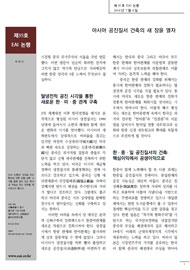 [EAI Commentary No. 35] Building a Coevolutionary Order in Asia by Chairman Young-Sun Ha [EAI Commentary No. 35] Building a Coevolutionary Order in Asia by Chairman Young-Sun Ha
Overcoming a Cold War mindset, and building a new coevolutionary order in Asia is what Chairman Ha of the EAI envisions as a major challenge facing South Korea and her neighbors. In light of Chinese President Xi Jinping’s recent visit to Seoul, Chairman Ha outlines how a prerequisite of this new order involves nations avoiding entanglements between domestic and international politics, and he urges North Korea to engage in byungjin 2.0 or the simultaneous pursuit of non-nuclear security and economic development. 
|
[Smart Q&A: T.J. Pempel] Will Japan Overcome Abe’s Revisionist Tendencies?
 A renowned Political Scientist at the U.C. Berkleley, T.J. Pempel, held a Smart Q&A session hosted by Yul Sohn, the chair of EAI’s Center for Japan Studies. Pempel outlined his views in relation to the growing concerns around Japanese Prime Minister Shinzo Abe’s apparent historical revisionism. Pempel pointed out that historical revisionism and right-wing policies in Japan is not only problematic for South Korea, China and the U.S. but also harmful for Japan as its regional relations deteriorate. A renowned Political Scientist at the U.C. Berkleley, T.J. Pempel, held a Smart Q&A session hosted by Yul Sohn, the chair of EAI’s Center for Japan Studies. Pempel outlined his views in relation to the growing concerns around Japanese Prime Minister Shinzo Abe’s apparent historical revisionism. Pempel pointed out that historical revisionism and right-wing policies in Japan is not only problematic for South Korea, China and the U.S. but also harmful for Japan as its regional relations deteriorate.  |
JEAS Addresses Current Issues in East Asia and Surrounding Regions
 Journal of East Asian Studies (JEAS) publishes articles based on original research on a range of topics that are key to our understanding of East Asia and its surrounding countries. Journal of East Asian Studies vol.14 no.2, published this month includes “The Economic Logic of Asia Preferential Trade Agreements” by Mark S. Manger, “China’s Media Censorship” by Giuqing Tai, “Language Stereotypes in Contemporary Taiwan” co-authored by Yu-tzung Chang and Jie Lu, “Party System Fragmentation in Indonesia” by Dirk Tomsa, and “Korea Bilateral Official Development Assistance to Africa under Korea’s Initiative for Africa’s Development” co-authored by Min Yung Yoon and Chungshik Moon. Also included are re reviews of recent publications. Journal of East Asian Studies (JEAS) publishes articles based on original research on a range of topics that are key to our understanding of East Asia and its surrounding countries. Journal of East Asian Studies vol.14 no.2, published this month includes “The Economic Logic of Asia Preferential Trade Agreements” by Mark S. Manger, “China’s Media Censorship” by Giuqing Tai, “Language Stereotypes in Contemporary Taiwan” co-authored by Yu-tzung Chang and Jie Lu, “Party System Fragmentation in Indonesia” by Dirk Tomsa, and “Korea Bilateral Official Development Assistance to Africa under Korea’s Initiative for Africa’s Development” co-authored by Min Yung Yoon and Chungshik Moon. Also included are re reviews of recent publications. 
|
Ministry of Defence Officials from the United Kingdom Visit EAI
 On June 30, the EAI was given the rare privilege to engage in a discussion with officials from the Ministry of Defence of the United Kingdom. Defense officials present at the discussion included Air Commodore Nicholas Bray and Brigadier Andrew Cliffe, United Kingdom Defence Attaché to Korea. The members of the panel moderated by EAI's Chaesung Chun discussed the U.K.'s position on many security issues such as the future architecture of defense arrangements in the Northeast Asia region. On June 30, the EAI was given the rare privilege to engage in a discussion with officials from the Ministry of Defence of the United Kingdom. Defense officials present at the discussion included Air Commodore Nicholas Bray and Brigadier Andrew Cliffe, United Kingdom Defence Attaché to Korea. The members of the panel moderated by EAI's Chaesung Chun discussed the U.K.'s position on many security issues such as the future architecture of defense arrangements in the Northeast Asia region. 
|
Roundtable with Hon. Thomas Schäfer, the German Ambassador to Pyongyang
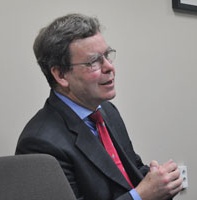 On Wednesday July 9, the EAI received the Hon. Thomas Schäfer, German Ambassador to Pyongyang. Ambassador Schäfer shared his views and opinions with experts from the EAI’s Center for North Korea Studies, on issues related to the current status and future direction of the North Korean economy in particular. He also gave insights into his experiences with the new leadership in Pyongyang and the latest reforms in the governance systems of our reclusive neighbor. On Wednesday July 9, the EAI received the Hon. Thomas Schäfer, German Ambassador to Pyongyang. Ambassador Schäfer shared his views and opinions with experts from the EAI’s Center for North Korea Studies, on issues related to the current status and future direction of the North Korean economy in particular. He also gave insights into his experiences with the new leadership in Pyongyang and the latest reforms in the governance systems of our reclusive neighbor. 
|
Korea Friendship Project Academicus Series Wraps-up on a High Security Note
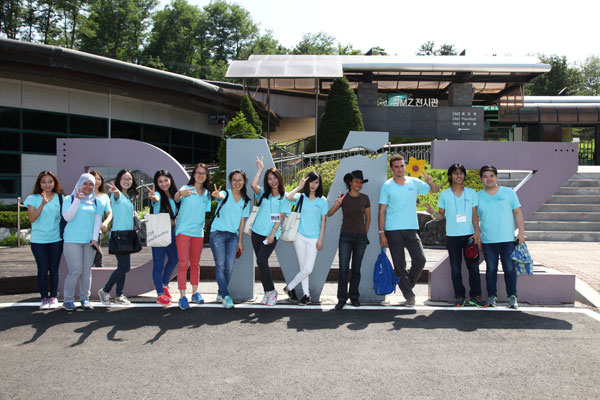 The Korea Friendship Project Lecture Series came to a close on July 11 with participants given the unique opportunity to visit one of the world’s most heavily militarized borders; the DMZ that separates the two Koreas. The Korea Friendship Project Academicus ran a series of lectures that included a wide range of topics such as Korean culture and economy, arts and society, diplomacy and politics, and finally culminating in a visit to the Joint Security Area at the DMZ. The Korea Friendship Project Lecture Series came to a close on July 11 with participants given the unique opportunity to visit one of the world’s most heavily militarized borders; the DMZ that separates the two Koreas. The Korea Friendship Project Academicus ran a series of lectures that included a wide range of topics such as Korean culture and economy, arts and society, diplomacy and politics, and finally culminating in a visit to the Joint Security Area at the DMZ. 
|
KAIST Students Visit EAI to Learn about the Policy World
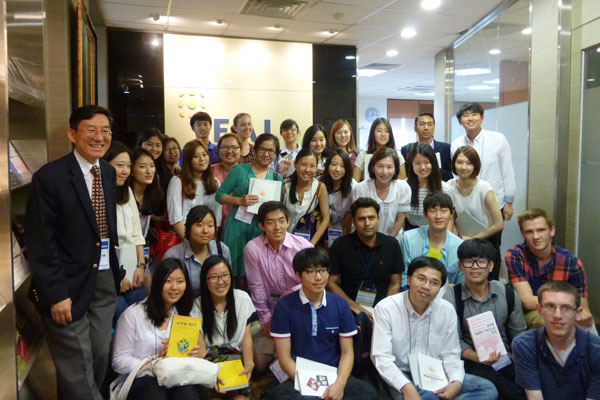 On July 8, students from the Nonproliferation Education and Research Center (NEREC) at KAIST visited the EAI. The information session led by EAI’s staff offered the students an opportunity to learn about EAI’s history and vision. During the lively Q&A session with EAI’s President Sook-Jong Lee, the students asked questions about EAI’s activities and its role as a Korean policy think-tank as well as President Lee’s experience as a female leader in the policy world. On July 8, students from the Nonproliferation Education and Research Center (NEREC) at KAIST visited the EAI. The information session led by EAI’s staff offered the students an opportunity to learn about EAI’s history and vision. During the lively Q&A session with EAI’s President Sook-Jong Lee, the students asked questions about EAI’s activities and its role as a Korean policy think-tank as well as President Lee’s experience as a female leader in the policy world. 
|
EAI Sarangbang Travels to Japan for Fieldwork
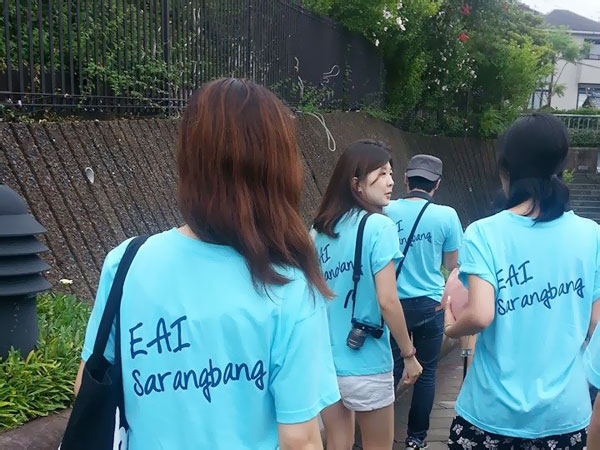 The EAI Sarangbang program, a series of lectures established in 2012 by EAI Chairman Young-Sun Ha for promising graduate students, travelled to Japan from June 26 to 28 for a field research. The students led by Chairman Ha visited historical sites where they could witness the evolving international relations and regional dynamics including the Sasebo U.S. Navy base in Fukuoka, Nagasaki Atomic Bomb Museum, Saga Prefectural Nagoya Castle Museum, Sino-Japanese Peace Memorial Hall, and Kyushu National Museum. The travel-log and reports from the trip will be collected and published as an E-book. The EAI Sarangbang program, a series of lectures established in 2012 by EAI Chairman Young-Sun Ha for promising graduate students, travelled to Japan from June 26 to 28 for a field research. The students led by Chairman Ha visited historical sites where they could witness the evolving international relations and regional dynamics including the Sasebo U.S. Navy base in Fukuoka, Nagasaki Atomic Bomb Museum, Saga Prefectural Nagoya Castle Museum, Sino-Japanese Peace Memorial Hall, and Kyushu National Museum. The travel-log and reports from the trip will be collected and published as an E-book. 
|
#909 Sampoong B/D, Eulji-ro 158, Jung-gu, Seoul 100-786, Republic of Korea
Tel 82 2 2277 1683 | Fax 82 2 2277 1684/1697 | Email EAI | Unsubscribe
Copyright 2014© EAST ASIA INSTITUTE. All Rights Reserved. |

